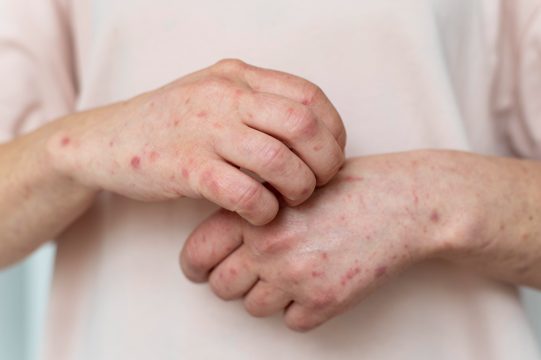Pityriasis Rosea and Diet: Is There a Connection?
Pityriasis Rosea is a common skin condition that typically affects individuals between the ages of 10 and 35. It is characterized by a distinctive rash that usually appears on the torso, upper arms, neck or thighs. While the exact cause of Pityriasis Rosea is still unknown, it is thought to be triggered by a viral infection. This condition is usually harmless and tends to resolve on its own within 6-8 weeks.

However, managing Pityriasis Rosea could be influenced by various factors such as one's diet. Embracing a healthy lifestyle, including a balanced diet, is key to managing Pityriasis Rosea. Nutrient-rich foods may bolster the immune system, potentially easing symptoms or hastening recovery.
It's important to stay hydrated, and avoid allergens or irritants that may exacerbate the condition. Regular exercise and adequate rest can also play a crucial role in overall well-being.
Remember, Pityriasis Rosea may be an unwelcome guest, but with care and patience, it's usually temporary. Always consult with a healthcare professional for personalized advice.
About Pityriasis Rosea
Pityriasis Rosea begins with a single, large pink patch on the chest or back, known as the 'herald patch'. After a few days to weeks, more skin rashes appear on the body.
These rashes are typically smaller, oval-shaped and may follow the lines of the ribs in a pattern similar to that of a fir tree. While these rashes can be itchy, they are usually not painful.
The overall health impact of Pityriasis Rosea is minimal and it does not typically cause any long term skin damage. However, the appearance of the rash can be concerning to those affected, resulting in a potential psychological impact.
Pityriasis Rosea is a skin condition that kicks off with a singular, large pink patch prominently appearing on the chest or back, fondly referred to as the 'herald patch'. As days turn into weeks, a constellation of smaller, oval-shaped rashes begin to emerge, often tracing the rib lines in a pattern that intriguingly mirrors the branches of a fir tree. While these rashes may instigate a bout of itchiness, they seldom induce pain.
The overall health implications of Pityriasis Rosea are generally low key, and the condition seldom results in any long-lasting skin damage. However, its manifestation can be unsettling for the individuals affected, triggering a wave of psychological discomfort due to the sudden change in their physical appearance.
Diet and Pityriasis Rosea
Although there is no scientific evidence directly linking diet to Pityriasis Rosea, it is well-known that one's diet can influence overall skin health. Eating a balanced diet rich in antioxidants, vitamins and minerals can help to promote healthy skin. Foods that are high in Omega-3 fatty acids, like fish and flaxseed, can help to reduce inflammation in the body and may potentially minimize the severity of Pityriasis Rosea symptoms. Similarly, foods rich in Vitamin C, such as citrus fruits and bell peppers, can boost the immune system and aid in skin repair.
To amplify this, it's beneficial to stay hydrated, as water helps eliminate toxins from the body, which can also contribute to improved skin health. Additionally, limiting intake of processed foods, sugars, and unhealthy fats might aid in the prevention of exacerbating symptoms.
Incorporating probiotics, found in yogurt and fermented foods, can also bolster gut health, which is linked to skin health. Thus, while there isn't direct evidence of diet affecting Pityriasis Rosea, a wholesome and balanced diet can certainly play an integral role in managing its symptoms and promoting overall skin wellness.
Should I Avoid Any Foods or Drinks If I Have Pityriasis Rosea?
While there are no specific foods or drinks that are known to worsen Pityriasis Rosea, it is generally advisable to maintain a healthy diet and avoid foods that may trigger inflammation in the body. This includes foods that are high in saturated and trans fats, such as fried foods and baked goods.
Alcohol and caffeine should also be consumed in moderation as they can dehydrate the skin, potentially exacerbating itchiness and skin discomfort. In the quest to manage Pityriasis Rosea better, an overall balanced diet could be your ally. Steering clear of inflammation-causing foods, particularly those laden with saturated and trans fats like deep-fried delicacies and baked goodies, is a smart move.
Additionally, moderation is key when it comes to alcohol and caffeine, as overconsumption can lead to skin dehydration, potentially heightening the itchiness and discomfort. So, while there's no 'miracle food' for Pityriasis Rosea, healthy eating habits can certainly play a supportive role in your journey towards relief.
The Role of Hydration
Hydration plays a crucial role in maintaining skin health. Water helps to keep the skin hydrated and may potentially alleviate some of the symptoms associated with Pityriasis Rosea, such as dryness and itchiness. Therefore, it is advisable to drink plenty of fluids, particularly water, while dealing with this skin condition. Avoiding dehydrating drinks like alcohol and caffeine can also be beneficial.
Delving deeper, hydration is the skin's best friend and an essential part of combating Pityriasis Rosea. Water, the elixir of life, not only maintains skin moisture but could also soothe symptoms like dryness and itchiness.
To foster skin health, it's essential to keep the body well-hydrated by sipping on fluids throughout the day, water being the top choice. Steering clear of dehydrating substances like alcohol and caffeine is another effective strategy. Embrace hydration, and let your skin bloom with health and vitality.
Topical Treatments for Pityriasis Rosea
In addition to maintaining a healthy diet and staying hydrated, there are various topical treatments available to manage the symptoms of Pityriasis Rosea. Over-the-counter creams and ointments containing hydrocortisone can help to reduce inflammation and itching. In more severe cases, a doctor may prescribe a stronger topical steroid.
Emollients can also be used to moisturize the skin and relieve dryness. It is important to note that these treatments do not cure Pityriasis Rosea, but they can help to manage the symptoms until the condition resolves naturally. To ensure a more comfortable journey towards recovery, integrating a plethora of topical remedies can effectively alleviate the troublesome symptoms of Pityriasis Rosea.
These include OTC creams imbued with hydrocortisone, a potent agent in dampening inflammation and itching, while emollients promise to rehydrate parched skin. For those grappling with more aggressive symptoms, a potent prescription-only topical steroid could be the answer.
Remember, these treatments are a temporary salve, a balm to soothe and manage symptoms, rather than a cure. Ultimately, Pityriasis Rosea recedes naturally, leaving your skin as it once was - a testament to your body's incredible resilience.
The Importance of a Balanced Diet
While diet may not directly influence the course of Pityriasis Rosea, maintaining a balanced diet is essential for overall health and wellbeing. Eating a variety of foods from all food groups can ensure an adequate intake of essential nutrients needed for skin health.
Foods rich in antioxidants can protect the skin from damage, while foods high in Omega-3 fatty acids can help to reduce inflammation. Additionally, staying hydrated can help to keep skin moisturized and may alleviate some of the symptoms associated with Pityriasis Rosea. In the grand scheme of health, the role of diet might not directly alter the course of Pityriasis Rosea, yet it indubitably plays a pivotal role in maintaining overall wellness. A well-rounded diet, brimming with diverse foods from every food group, guarantees the body's absorption of vital nutrients that fortify skin health.
Indulging in antioxidant-rich foods shields the skin from harmful damage, and Omega-3 fatty acid laden foods aid in curbing inflammation. Moreover, keeping hydration levels optimal can ensure skin stays moisturized, potentially easing some of the discomforting symptoms linked to Pityriasis Rosea. Essentially, a balanced diet and hydration could be your armor in your skirmish against this skin condition.
Conclusion
In conclusion, while there is no direct link between diet and Pityriasis Rosea, maintaining a healthy, balanced diet and staying hydrated can potentially help to manage the symptoms of this skin condition. It's always a good idea to consult with a healthcare professional to discuss any concerns or questions about diet and skin health.
Remember, while Pityriasis Rosea can cause discomfort and concern due to the appearance of the rash, it is typically a self-limiting condition that resolves on its own within several weeks. In conclusion, though Pityriasis Rosea and diet don't share a direct link, embracing a nutritious, balanced diet and proper hydration can play a pivotal role in managing this skin condition's symptoms.
A discussion with a healthcare professional about any diet and skin health concerns or queries is always beneficial. Don't forget, Pityriasis Rosea, though potentially disconcerting due to its rash manifestation, usually resolves independently within a few weeks, bringing you back to your radiant self. So keep your spirits high and remember, your skin health is as important as your overall wellbeing.
About us
Welcome to HealsHub! Your go-to source for all things related to health and wellness! We're here to help you lead a healthier, happier life by providing you with the latest news, research, and advice on topics like nutrition, fitness, mental health, and more. Our mission is to empower you to take control of your health and well-being through education and inspiration. Whether you're looking to lose weight, build muscle, manage stress, or simply learn more about how your body works, you'll find everything you need right here on healshub.com. We believe that everyone deserves to live a healthy, fulfilling life, and we're committed to providing you with the tools and resources you need to achieve your goals. So take a look around, explore our articles and resources, and start your journey towards better health today!

